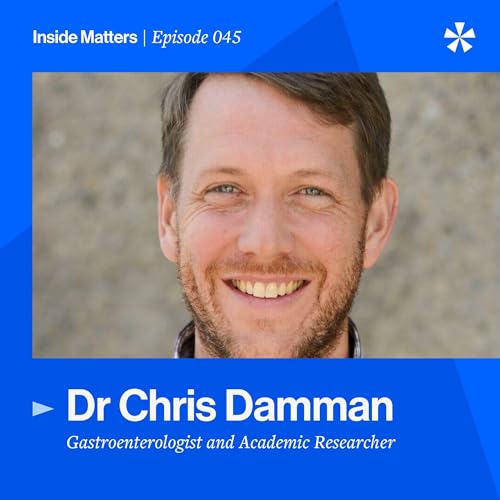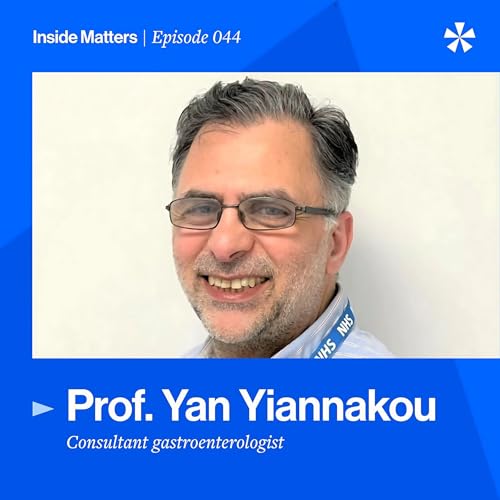In this episode of Inside Matters, Dr James McIlroy is joined by Professor Yan Yiannakou to discuss the developments in IBS treatment. Irritable bowel syndrome (IBS) is often brushed off as little more than an inconvenience. But in a recent conversation between Dr James McIlroy and Professor Yan Yiannakou, a consultant gastroenterologist with decades of experience, it’s clear that IBS is far more serious than many realise. Their discussion sheds light on the true impact of IBS and the exciting developments in its treatment.
IBS: A Closer Look
Affecting around 10–15% of the population, IBS can be life-altering for some. Beyond the discomfort, it can seriously disrupt work, relationships, self-confidence, and mental health. Historically, because there was little visible evidence of physical disease, IBS was wrongly considered a psychological condition. Thankfully, this outdated view is changing. New research highlights real physiological changes in the gut, such as immune activation and heightened sensitivity, helping to validate patients’ experiences.
Recognising the Symptoms
Professor Yiannakou explains that IBS typically involves abdominal pain, changes in bowel habits, bloating, and excess wind. Previously labelled a “syndrome” because its causes weren’t well understood, IBS is now recognised as a real disease linked to changes in the gut microbiome and immune system. Symptoms can vary from mild discomfort to severe, debilitating pain that significantly affects daily life.
Breaking Down Misconceptions
A key part of the conversation tackles the myth that IBS is “all in the mind.” While stress can worsen symptoms, it is not the root cause. Dismissing IBS as purely psychological can deepen patients’ distress and delay proper care. Professor Yiannakou stresses the importance of treating IBS as the genuine, physical condition it is.
What Causes IBS?
Although the exact causes are still being explored, IBS often develops after a major gut infection, which can disrupt the gut’s immune system. Treatments are now moving beyond simply managing symptoms like constipation or diarrhoea, with more focus on addressing underlying causes, particularly gut microbiome imbalances.
Hope for the Future
Research into the microbiome’s role in IBS is opening up new treatment options. Early trials of microbiome-based therapies show promising results, but more work is needed to bring these breakthroughs into everyday clinical practice.
Final Thoughts
Professor Yiannakou’s insights highlight the urgent need for better recognition and treatment of IBS. Dispelling outdated myths and focusing on the true physiological causes of the condition offers real hope for those living with IBS. As research continues, the future looks brighter for more effective, lasting treatments.
The conversation touches on everything from genetic influences on obesity and the challenges of sustained weight loss, to the exciting potential of GLP-1 drugs and next-generation probiotics. There’s also a fascinating look at how the microbiome might act as both a diagnostic and therapeutic tool in future medicine.
Finally, Max shares highlights from his book The Power of Hormones, which brings together history, science, and practical advice for anyone curious about how hormones and the microbiome shape our lives.
This episode offers an insightful look at where cutting-edge science meets real-world potential—and why the microbiome could be the key to a healthier future.
Timestamps:
00:00 Introduction to Professor Yan Yau and IBS 01:02 Understanding the Impact of IBS 02:19 Symptoms and Diagnosis of IBS 04:41 Physiological Causes of IBS 06:29 Severity and Psychological Impact of IBS 09:31 Potential Causes and Triggers of IBS 14:22 Current Treatments and Challenges 16:30 Future of IBS Treatments and Research 40:39 Clinical Trials and Patient Involvement 42:32 Conclusion and Final Thoughts
 1 h y 10 m
1 h y 10 m 1 h y 5 m
1 h y 5 m Jun 12 20251 h y 8 m
Jun 12 20251 h y 8 m 1 h y 14 m
1 h y 14 m 45 m
45 m 1 h y 17 m
1 h y 17 m 18 m
18 m 1 h y 1 m
1 h y 1 m

